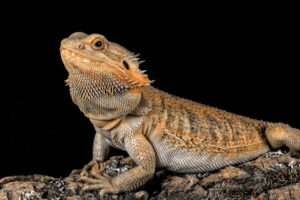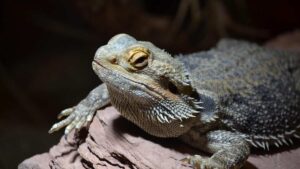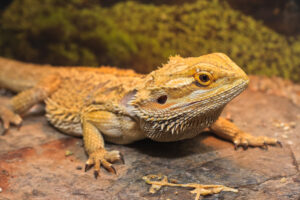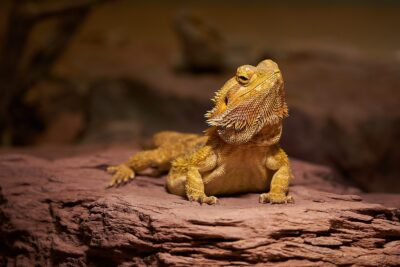What do bearded dragons eat in the wild? It’s a question that beckons us to explore the natural dining preferences of these fascinating reptiles. While we often associate these creatures with their domesticated diet, understanding their choices in the wild provides invaluable insights into their biology and behavior.
In the wild, bearded dragons are opportunistic omnivores, meaning they eat a wide variety of both animal and plant matter. Their diet typically consists of insects such as crickets, roaches, mealworms, and grasshoppers, which provide essential protein and nutrients. Additionally, they consume vegetation such as leaves, flowers, fruits, and even the occasional small vertebrate like lizards or rodents.
Their adaptable diet allows them to thrive in diverse environments, ranging from arid deserts to woodland areas, where they forage for food among rocks, bushes, and trees. This versatility in their dietary choices is a key factor in their survival and success in the wild.
Dietary Needs of Bearded Dragons

The dietary needs of bearded dragons are crucial for their overall health and well-being, whether in the wild or captivity. These reptiles require a balanced diet that includes both animal protein and plant matter to meet their nutritional requirements. Here’s a breakdown of their dietary needs:
- Protein: Bearded dragons are carnivorous reptiles and require a significant portion of their diet to consist of protein. Insects such as crickets, roaches, mealworms, and dubia roaches are excellent sources of protein for them. Feeding them live insects provides mental stimulation and encourages natural hunting behaviors.
- Vegetables: Alongside animal protein, bearded dragons need a variety of vegetables to ensure they receive essential vitamins and minerals. Dark, leafy greens like collard greens, mustard greens, and dandelion greens are excellent choices. Other suitable vegetables include bell peppers, carrots, squash, and green beans. These vegetables should be finely chopped or shredded to make them easier for bearded dragons to consume.
- Fruits: While fruits should only make up a small portion of a bearded dragon’s diet due to their high sugar content, they can still provide important vitamins and minerals. Offer fruits such as strawberries, blueberries, mango, and papaya as occasional treats.
- Calcium and Vitamin D3: Bearded dragons require calcium and vitamin D3 for proper bone growth and health. Dusting their insects with a calcium supplement powder and providing them with access to UVB lighting for adequate vitamin D3 synthesis is essential.
- Water: Hydration is crucial for bearded dragons, and they should always have access to clean, fresh water. Some bearded dragons prefer to drink water by licking droplets off leaves or surfaces, so misting their enclosure can help provide hydration.
- Gut Loading: When feeding live insects to bearded dragons, it’s essential to gut load the insects with nutritious foods such as leafy greens, vegetables, and commercial gut load products. This ensures that the insects are nutritionally enriched before being consumed by the bearded dragon.
By providing a balanced diet that meets their nutritional needs, bearded dragons can thrive and live healthy, active lives. It’s essential to offer a variety of foods to ensure they receive all the essential nutrients required for optimal health.
What do bearded dragons eat in the wild
In the wild, bearded dragons are opportunistic omnivores, meaning they consume a diverse range of both animal and plant matter. Their diet primarily consists of insects such as crickets, roaches, mealworms, grasshoppers, beetles, and caterpillars. They also hunt smaller lizards, rodents, and sometimes even birds, providing them with essential protein and nutrients.
Plant matter is also a significant part of their diet. Bearded dragons feed on a variety of vegetation including leaves, flowers, fruits, and occasionally, even small succulents and berries. Their plant intake helps provide fiber, vitamins, and minerals essential for their overall health.
Also, bearded dragons are known to forage for food in their natural habitat, which typically includes arid and semi-arid regions such as deserts, scrublands, and woodlands. They use their keen sense of sight to locate prey and vegetation among rocks, bushes, and trees.
The adaptability of their diet allows them to thrive in different environments and adjust their food choices based on seasonal availability. However, their diet may vary depending on factors such as location, climate, and the availability of prey and vegetation in their habitat.
Factors Influencing Diet

Several factors influence the diet of bearded dragons, both in the wild and in captivity. Understanding these factors is crucial for providing them with a balanced and nutritious diet:
- Habitat and Environment: The specific habitat and environment where a bearded dragon resides play a significant role in determining its diet. Bearded dragons in arid desert regions may have access to different food sources compared to those in woodland or scrubland environments.
- Seasonal Availability: The availability of prey and vegetation can vary seasonally. Insects and plants may be more abundant during certain times of the year, influencing the bearded dragon’s diet accordingly.
- Age and Life Stage: The dietary needs of bearded dragons vary depending on their age and life stage. Juvenile bearded dragons require more protein for growth, while adult dragons may have different nutritional requirements to maintain their health.
- Health Status: The health status of a bearded dragon can affect its dietary preferences and requirements. Illness, injury, or underlying health conditions may impact appetite and digestion, necessitating adjustments to the diet.
- Individual Preferences: Like humans, bearded dragons may have individual preferences when it comes to food. Some individuals may prefer certain types of insects or vegetables over others.
- Social Interaction: In captivity, bearded dragons may observe and mimic the feeding behaviors of conspecifics or other animals in their environment. Social interaction can influence their dietary choices and feeding behaviors.
- Feeding Schedule and Routine: Establishing a consistent feeding schedule and routine can help regulate a bearded dragon’s appetite and ensure it receives adequate nutrition. Regular feeding times and portion sizes can contribute to overall health and well-being.
By considering these factors, bearded dragon owners can tailor their pet’s diet to meet its specific nutritional needs and preferences, promoting optimal health and longevity. Regular observation and monitoring of the dragon’s behavior and condition can also help identify any dietary adjustments that may be necessary.
Recommended foods for captive bearded dragons
For captive bearded dragons, it’s essential to offer a varied and balanced diet that replicates their natural dietary preferences and nutritional requirements. Here are some recommended foods for captive bearded dragons:
- Insects:
- Crickets: A staple insect rich in protein. Ensure they are appropriately sized for your dragon.
- Dubia Roaches: Another excellent source of protein and relatively easy to digest.
- Mealworms (in moderation): While high in protein, they should be offered sparingly due to their hard exoskeleton.
- Superworms (in moderation): Similar to mealworms, they should be fed in moderation and preferably as treats due to their high-fat content.
- Phoenix Worms (Calciworms) or Black Soldier Fly Larvae: High in calcium, making them a nutritious choice.
- Vegetables:
- Dark, leafy greens: Collard greens, mustard greens, kale, turnip greens, and dandelion greens are excellent sources of vitamins and minerals.
- Squash: Butternut squash, acorn squash, and pumpkin provide essential nutrients and hydration.
- Bell peppers: Offered in moderation, they add variety and are a good source of vitamins.
- Fruits (as occasional treats):
- Berries: Blueberries, strawberries, and raspberries are low in sugar and high in antioxidants.
- Papaya and mango: These fruits are rich in vitamins and can be offered in small quantities as treats.
- Apple and pear (without seeds): Offered sparingly, they provide natural sweetness and fiber.
- Commercial Pellets or Prepared Diets:
- Commercial diets formulated specifically for bearded dragons can be convenient and ensure balanced nutrition. Look for brands recommended by reptile veterinarians.
- Calcium and Vitamin Supplements:
- Dust live insects with a calcium supplement powder before feeding to ensure your dragon receives adequate calcium.
- Multivitamin supplements can also be offered occasionally, following the manufacturer’s recommendations.
It’s essential to provide a variety of foods to ensure your bearded dragon receives all the necessary nutrients. Avoid feeding insects caught in the wild, as they may contain pesticides or parasites harmful to your pet.
Additionally, always provide fresh, clean water for hydration, and monitor your dragon’s health and appetite regularly. Consulting with a reptile veterinarian can provide further guidance on diet and nutrition for captive bearded dragons.
Strategies for providing balanced nutrition

Ensuring balanced nutrition is vital for the health and well-being of captive bearded dragons. Here are some strategies to help achieve this:
- Varied Diet: Offer a diverse selection of insects, vegetables, and occasional fruits to provide a range of nutrients. This mimics the natural diet of bearded dragons and helps prevent nutritional deficiencies.
- Gut Loading: Feed insects a nutritious diet before offering them to your bearded dragon. This process, known as gut loading, enhances the nutritional value of the insects, ensuring your dragon receives optimal nutrition.
- Calcium and Vitamin Supplements: Dust insects with a calcium supplement powder before feeding them to your dragon. Additionally, provide multivitamin supplements occasionally to prevent deficiencies.
- Proper Insect Size: Ensure the size of insects offered to your bearded dragon is appropriate for its age and size. Feeding oversized insects can lead to choking or digestive issues.
- Leafy Greens: Offer a variety of dark, leafy greens such as collard greens, mustard greens, and dandelion greens. These are rich in vitamins and minerals essential for overall health.
- Vegetables: Provide a selection of vegetables such as squash, bell peppers, and carrots. These offer additional vitamins and fiber to the diet.
- Fruits as Treats: Offer fruits such as berries, papaya, and mango as occasional treats due to their higher sugar content. Limit the amount offered to prevent obesity and other health issues.
- Monitor and Adjust: Monitor your bearded dragon’s health and appetite regularly. Adjust its diet as necessary based on its growth, activity level, and overall condition.
- Hydration: Ensure your bearded dragon has access to fresh, clean water at all times. Some dragons may prefer to drink water from a shallow dish, while others may drink droplets from misting or sprayed vegetation.
- Consult with a Veterinarian: If you’re unsure about your bearded dragon’s nutritional needs or if you notice any signs of nutritional deficiencies, consult with a reptile veterinarian. They can provide personalized recommendations based on your dragon’s specific requirements.
By implementing these strategies, you can provide balanced nutrition to your bearded dragon, promoting its overall health and longevity.
Conclusion
What do bearded dragons eat in the wild encompasses a diverse array of prey and vegetation, reflecting their status as opportunistic omnivores. Their diet includes insects like crickets, roaches, and grasshoppers, as well as a variety of plant matter such as leaves, flowers, and fruits.
This adaptability allows them to thrive in different environments, ensuring they obtain the necessary nutrients for survival. By understanding their natural dietary habits, we can better replicate these choices in captivity, promoting the health and well-being of these fascinating reptiles.

